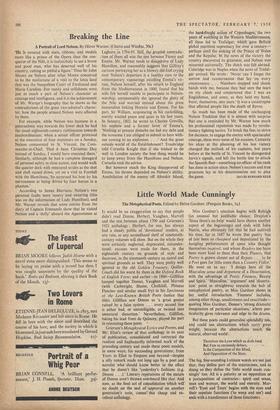.,Breaking the Line
A Portrait of Lord Nelson. By Oliver Warner. (Chatto and Windus, 30s.)
'HE is covered with stars, ribbons, and medals more like a prince of the Opera than the con- queror of the Nile, it ismelancholy to see a brave and good man, who has deserved well of his country, cutting so pitiful a figure.' Thus Sir John Moore on Nelson after what Moore conceived to be the misfortune of a visit to the lotus land that was the Neapolitan Court of Ferdinand and Maria Carolina. For vanity and selfishness were just as much a part of Nelson's character as courage and intelligence, and it is the achievement, of Mr. Warner's biography that he shows us the contradictions of the great vice-admiral's charac- ter, how the. people around Nelson were affected. by them.
For example, while Nelson was humane in a paternalistic way towards the lower deck he had the usual eighteenth-century ruthlessness towards insubordination; when' a senior officer protested at the execution of four mutineers on a Sunday, Nelson commented to St. Vincent, the Com- mander-in-Chief, 'Had it . been Christmas Day instead of Sunday, I would have executed them.' Similarly, although he had a complete disregard of personal safety in close action, and would walk the quarter deck with measured strides as the shot and shell rained down, yet on a visit to Fonthill with the Hamiltons, 'he surprised his host by his nervousness at being driven by four horses in a phaeton.'
According to James Harrison, Nelson's two personal faults were venery and swearing (this was on .the information of Lady Hamilton), and Mr. Warner reveals that some entries from the diary of Captain Fremantle show that he visited Nelson and a 'dolly' aboard the Agamemnon at Leghorn in 1794-95. Still, the' greatest contradic- tion of them all was the one between Fanny and Emma. Mr. Warner tends to disapprove of Lady Hamilton, and reasonably suggests that Gilliay's cartoon portraying her as ablowzy Old fool crying over Nelson's departure is a healthy cure to the contemporary vapciurings extolling Emma's vir- tues,. Nelson himself, after his return to England from the Mediterranean in 1800, found that hii wife felt herself unable to participate in NelsOn- worship; unreasonably she ignored the glory of the Nile and worried instead about the press innuendoes linking Horatio and Emma. For his part, Sir William, acquiescing in his cuckolding, merely wanted peace and quiet in his last years. In January, 1802, he wrote to Charles Greville, his nephew and a former lover of Emma's, `Nothing at present'disturbs me but my debt and the nonsense I am obliged to submit to here with- out coming to an explosion. . . .' And the great outside world of the Establishment? Troubridge told Cornelia Knight that if she wished to do well in London society the best thing would be to keep away from the Hamiltons and Nelson. Cornelia took the advice.
But however much the King disapproved of Emma, his throne depended on Nelson's ability. Annihilation of the enemy off Aboukir Island,
the hard-Might action' of COpenhagcn,-' the two years of watching in the WeStern Mediterranean,, all' these led to Trafalgar, WhiCh "gave Britain global maritime supremacy for over a 'century--;- perhapi until the sinking of the Prinee of Wales and' the Repulse.- hi the news of the victory the country discovered its greatness, and Nelson was' mourned universally. The shriek waslelt abroad. Coleridge was in Naples when the news of Trafal- gar arrived. He wrote : `Never can I forget the sorrow and consternation that 'lay 'on every countenance. , . . Numbers• stopped and shook hands with 'me, because they 'had seen the tears On 'my cheek and cdnjectured that I was an Englishman, and some,' as they held my hand, burst, themselves, into tears.' It was a catastrophe that affected people like the death of Byron.
So much has been made of the unchanging Nelson Tradition 'that it is almost with surprise that one is reminded by Mr. Warner how much his professional reputation was made by 'revolu- tionary fighting tactics. To break the line, to strive for decision, to engage the enemy with spectacular courage, these were some of his maxims. Certainly his ideas at the planning of his last victory changed the outlook of his captains, but years before at the battle of St. Vincent he disregarded Jervis's signals, and left the battle line to attack the Spanish fleet—something no officer of his rank has done in action since.' Nelson's success and, true greatness lay in his determination not to .play


































 Previous page
Previous page